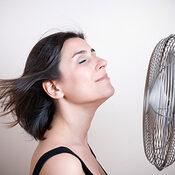 The decreasing
levels of estrogen during menopause can lead to many changes in a woman’s life
including a woman’s sexual functioning. At menopause, most women usually
experience low libido. Women in menopause may notice that they become less
sensitive to touch and stroking. This makes them very difficult to be aroused
and therefore the result will be a decreased interest in sex. The idea of sex
in general is usually initiated in the brain. The many symptoms that affect a
woman during menopause usually rob her peace of mind and therefore many
activities of the body that are supposed to be initiated or coordinated by the
brain don’t function efficiently. Menopause normally brings about a lot of
emotional changes. In particular, the negative emotional changes usually
contribute to the inability for a woman to get aroused and also loss of
interest for sexual activity.
The decreasing
levels of estrogen during menopause can lead to many changes in a woman’s life
including a woman’s sexual functioning. At menopause, most women usually
experience low libido. Women in menopause may notice that they become less
sensitive to touch and stroking. This makes them very difficult to be aroused
and therefore the result will be a decreased interest in sex. The idea of sex
in general is usually initiated in the brain. The many symptoms that affect a
woman during menopause usually rob her peace of mind and therefore many
activities of the body that are supposed to be initiated or coordinated by the
brain don’t function efficiently. Menopause normally brings about a lot of
emotional changes. In particular, the negative emotional changes usually
contribute to the inability for a woman to get aroused and also loss of
interest for sexual activity.
In a different perspective, the low levels of estrogen during menopause usually cause a decrease in the blood supply to the vagina. The decreased supply of blood to the vagina usually affects vaginal lubrication which in turn causes the vagina to be thin, pale and very dry. In most cases, the lower part of the vagina may shrink and dry leading to a painful experience during sexual intercourse. Even if a woman has an interest for sex but experiences a lot of pain during coitus, a woman may not enjoy it and therefore the act might not be meaningful to her.
During menopause, it is not only estrogen that is responsible for inhibiting the desire for sex. There are a number of other factors that cause a decrease in libido or influence a woman’s interest for sexual activity from perimenopause up to post menopause period. The factors may include: problems relating to bladder controls, sleep disturbances, severe anxiety, stress, medications, relationship problems with a partner and also health concerns. Most women normally report a low libido during menopause. Contrary to that, majority of women who are in post-menopausal stage report an increase in libido and sexual satisfaction. There could be some reasons about that. For instance, after menopause a woman is usually free from the menopausal symptoms and therefore she has a settled mind. On the other hand, at that time a woman does not have anxiety of becoming pregnant. So, a woman can relax and enjoy sex with her partner.
For the women who experience vaginal dryness, they can try to use water soluble lubricants before engaging in sex. It is a fact that it is difficult to discuss sexual problems but a woman should talk to her doctor about the problem. If the doctor cannot help much, he can refer the woman to a health professional who specializes in sexual dysfunction. The most important thing that a woman can do to be comfortable during menopause is to be open and discuss her problem with her partner so that the couple can look for a solution together. For a woman to be active and enjoy sex, she should try to relax and avoid anxiety. So, a woman should not let the condition rob her of her sex drive. If you are looking for more information, you can visit http://menopauseguide.com








